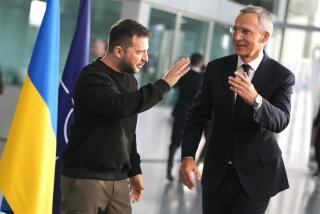Shultz, Soviets in Intensive Talks : Groups Set Up on Rights and Arms Control
- Share via
MOSCOW — Secretary of State George P. Shultz and Soviet Foreign Minister Eduard A. Shevardnadze held almost seven hours of intensive talks, including an unscheduled evening session, on embassy bugging, human rights and arms control issues Monday before setting up seven working groups to explore the rights and arms issues in greater detail today.
State Department spokesman Charles Redman refused to say what aspects of the embassy espionage incidents were discussed or whether the issue will be explored further. However, Tass, the official Soviet news agency, said the two sides were examining “conditions for the work of their embassies and diplomatic missions on the territory of the other side.”
‘A Long Agenda’
Redman characterized the daylong talks as “serious and businesslike,” adding that “the two (men) worked energetically toward getting through a very long agenda.” He declined to say whether progress had been made during the day.
The proliferation of expert working groups, five in arms control areas, indicated that no obvious impasse had yet occurred. But they did not mean that the three days of talks will end with a notable success, such as agreement in principle on how to reduce or eliminate both categories of intermediate-range nuclear missiles in Europe.
The two sides have agreed in principle to eliminate the longer-range missiles from the Continent while retaining 100 warheads each in this category. But they are seriously divided over the second category--shorter-range missiles, where the Soviets hold a monopoly. Moscow wants them frozen at present unequal levels, while the United States wants the right to equal levels.
Shultz took time from the meetings to call at a Seder, or Jewish Passover dinner, being held at Spasso House, the U.S. ambassador’s residence here, attended by about 35 refuseniks--those who have been denied permission to emigrate. He is the highest-ranking U.S. official to meet with Moscow dissidents since the human rights movement began here more than two decades ago.
To Meet With Gorbachev
While the embassy bugging row cast a shadow over Shultz’s visit, it did not appear to interfere significantly with his itinerary. He is scheduled to meet today with Soviet Premier Nikolai I. Ryzhkov on economic issues and also with Soviet Communist Party leader Mikhail S. Gorbachev before resuming talks with Shevardnadze in the evening.
To ensure secure communications, however, a special van was set up for Shultz’s messages to Washington and for meetings with his staff.
First on Shultz’s agenda of talks, a U.S. official said, was “the problem created by Soviet espionage” against the U.S. Embassy, which was taken up between the two men with only translators and note-takers present. Shultz has accused the Soviets of recruiting Marine guards to help them gather intelligence at the embassy and has described the Reagan Administration as “damned upset.”
With their experts, Shultz and Shevardnadze then took up human rights and humanitarian concerns, with a “full and extensive exchange” that covered both individual cases as well as general considerations, he said.
They agreed to set up the first of the working groups of experts on human rights issues. A second group will deal with bilateral issues.
Arms Control Groups
During the afternoon and evening sessions, they discussed five arms control issues and created working groups to deal with them. Foremost were the three topics currently being negotiated in Geneva: offensive intercontinental missiles and bombers, anti-missile space defenses and an INF (intermediate nuclear forces) treaty.
The INF issue is widely regarded as ripe for settlement within the next few months and likely to produce a summit meeting at which President Reagan and Gorbachev would sign it.
Two other topics--nuclear weapons testing and risk reduction centers--were the basis for the final two groups, although the U.S. official said a larger variety of arms control matters, including conventional forces and chemical weapons, were also discussed during the afternoon and evening meetings.
More to Read
Sign up for Essential California
The most important California stories and recommendations in your inbox every morning.
You may occasionally receive promotional content from the Los Angeles Times.













